Nursing Care Plan for Cancer Patients: Problems and Interventions
VerifiedAdded on 2020/06/03
|11
|2413
|98
Homework Assignment
AI Summary
This nursing care plan addresses the complex needs of cancer patients experiencing confusion, constipation, and activity intolerance. It provides a detailed analysis of each problem, including underlying justifications based on the patient's condition and relevant literature. The plan outlines specific nursing diagnoses, goals, and evidence-based interventions, along with the rationale behind each intervention. Key interventions include careful monitoring of mental status, promoting bowel regularity through fluid and fiber intake, and managing activity intolerance by assessing limitations and providing energy conservation techniques. The plan emphasizes the importance of continuous care, patient education, and addressing psychological factors to improve the overall quality of life for cancer patients. The document also references supporting literature to validate the interventions and their effectiveness.
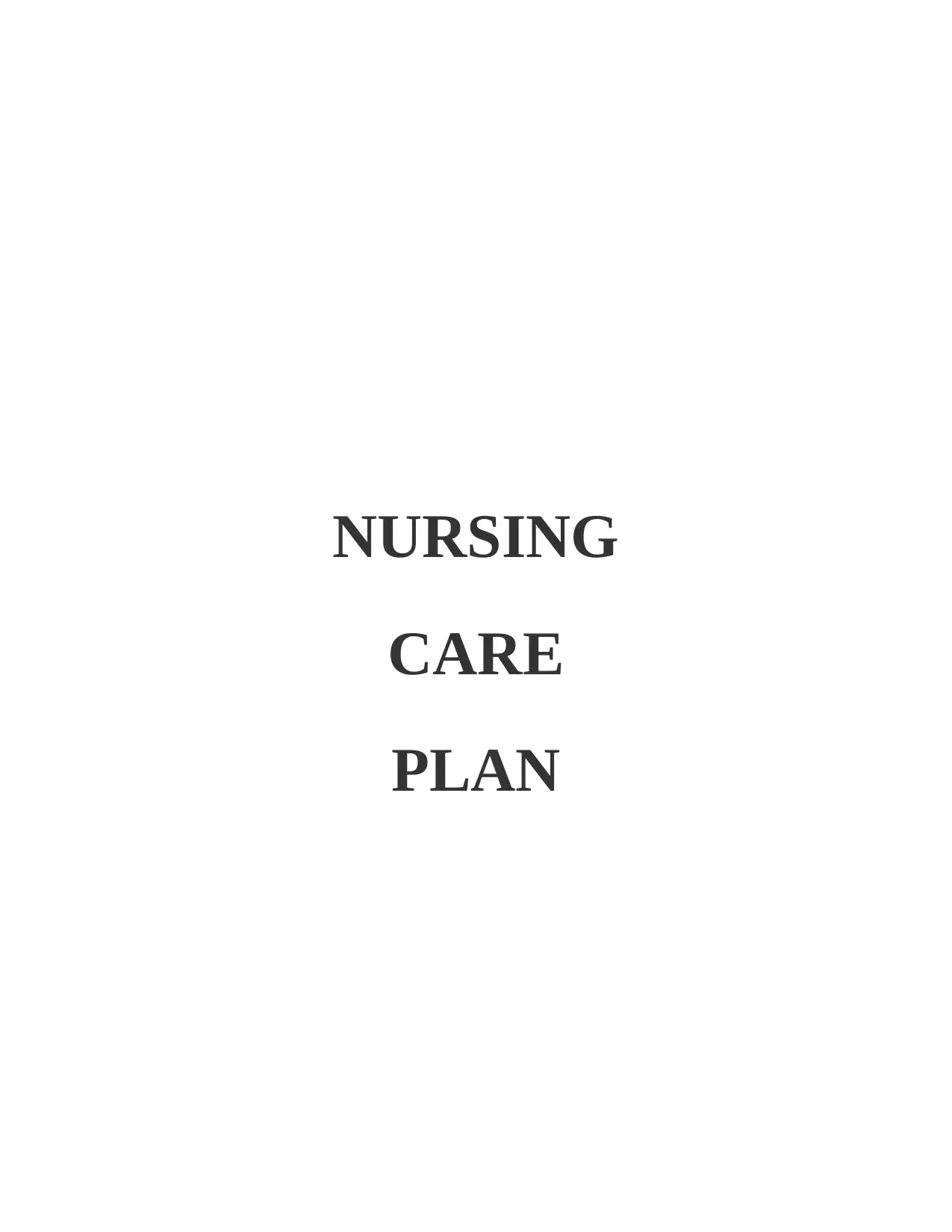
NURSING
CARE
PLAN
CARE
PLAN
Paraphrase This Document
Need a fresh take? Get an instant paraphrase of this document with our AI Paraphraser
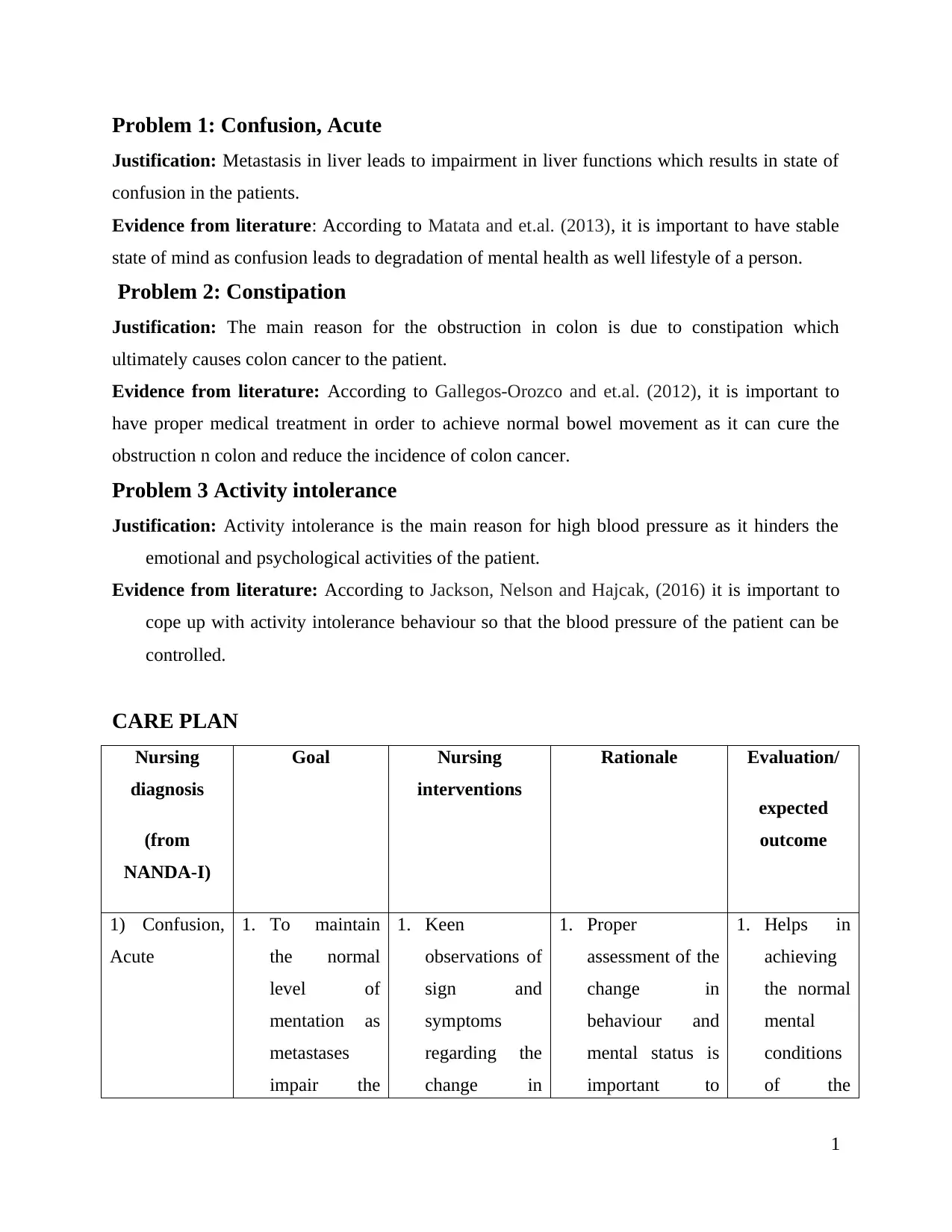
Problem 1: Confusion, Acute
Justification: Metastasis in liver leads to impairment in liver functions which results in state of
confusion in the patients.
Evidence from literature: According to Matata and et.al. (2013), it is important to have stable
state of mind as confusion leads to degradation of mental health as well lifestyle of a person.
Problem 2: Constipation
Justification: The main reason for the obstruction in colon is due to constipation which
ultimately causes colon cancer to the patient.
Evidence from literature: According to Gallegos-Orozco and et.al. (2012), it is important to
have proper medical treatment in order to achieve normal bowel movement as it can cure the
obstruction n colon and reduce the incidence of colon cancer.
Problem 3 Activity intolerance
Justification: Activity intolerance is the main reason for high blood pressure as it hinders the
emotional and psychological activities of the patient.
Evidence from literature: According to Jackson, Nelson and Hajcak, (2016) it is important to
cope up with activity intolerance behaviour so that the blood pressure of the patient can be
controlled.
CARE PLAN
Nursing
diagnosis
(from
NANDA-I)
Goal Nursing
interventions
Rationale Evaluation/
expected
outcome
1) Confusion,
Acute
1. To maintain
the normal
level of
mentation as
metastases
impair the
1. Keen
observations of
sign and
symptoms
regarding the
change in
1. Proper
assessment of the
change in
behaviour and
mental status is
important to
1. Helps in
achieving
the normal
mental
conditions
of the
1
Justification: Metastasis in liver leads to impairment in liver functions which results in state of
confusion in the patients.
Evidence from literature: According to Matata and et.al. (2013), it is important to have stable
state of mind as confusion leads to degradation of mental health as well lifestyle of a person.
Problem 2: Constipation
Justification: The main reason for the obstruction in colon is due to constipation which
ultimately causes colon cancer to the patient.
Evidence from literature: According to Gallegos-Orozco and et.al. (2012), it is important to
have proper medical treatment in order to achieve normal bowel movement as it can cure the
obstruction n colon and reduce the incidence of colon cancer.
Problem 3 Activity intolerance
Justification: Activity intolerance is the main reason for high blood pressure as it hinders the
emotional and psychological activities of the patient.
Evidence from literature: According to Jackson, Nelson and Hajcak, (2016) it is important to
cope up with activity intolerance behaviour so that the blood pressure of the patient can be
controlled.
CARE PLAN
Nursing
diagnosis
(from
NANDA-I)
Goal Nursing
interventions
Rationale Evaluation/
expected
outcome
1) Confusion,
Acute
1. To maintain
the normal
level of
mentation as
metastases
impair the
1. Keen
observations of
sign and
symptoms
regarding the
change in
1. Proper
assessment of the
change in
behaviour and
mental status is
important to
1. Helps in
achieving
the normal
mental
conditions
of the
1
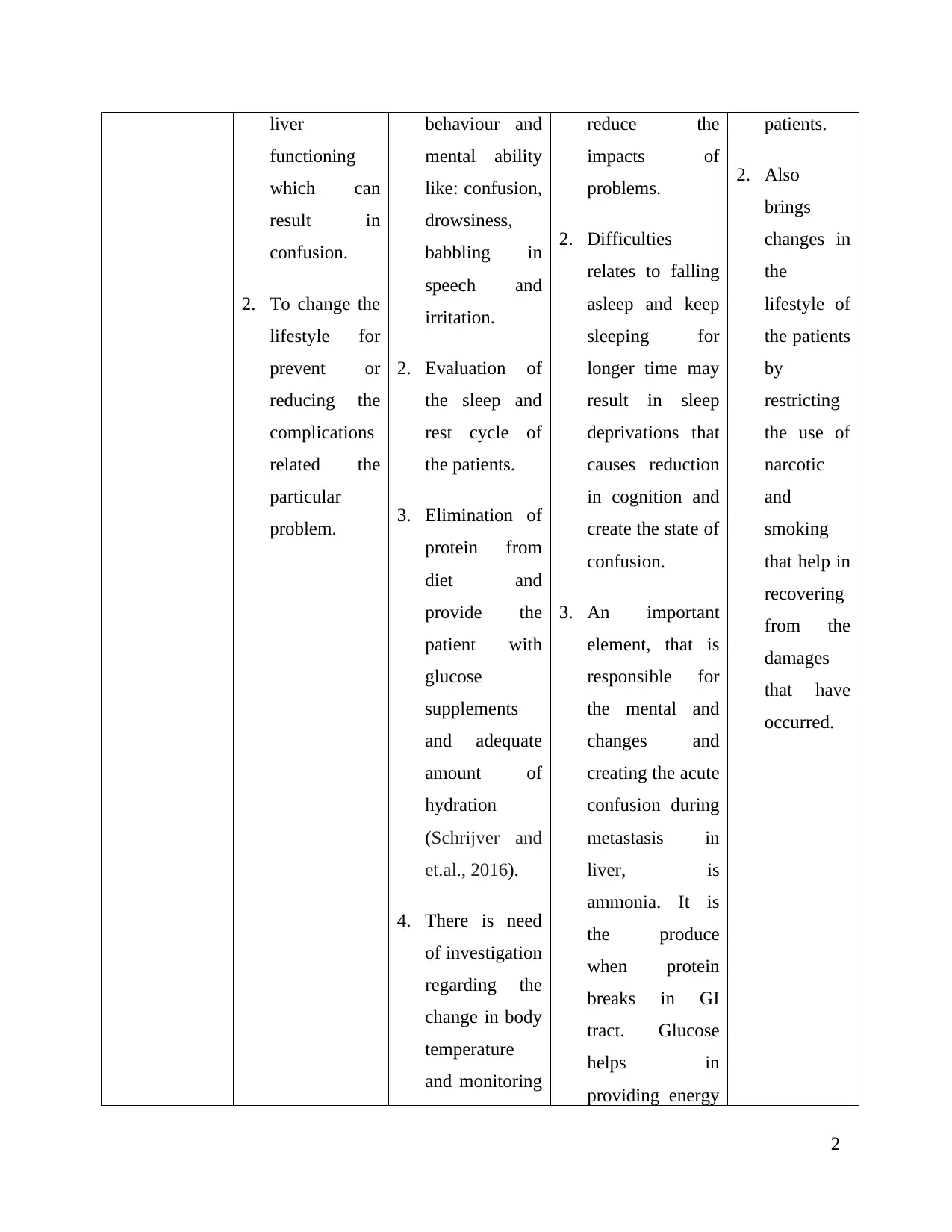
liver
functioning
which can
result in
confusion.
2. To change the
lifestyle for
prevent or
reducing the
complications
related the
particular
problem.
behaviour and
mental ability
like: confusion,
drowsiness,
babbling in
speech and
irritation.
2. Evaluation of
the sleep and
rest cycle of
the patients.
3. Elimination of
protein from
diet and
provide the
patient with
glucose
supplements
and adequate
amount of
hydration
(Schrijver and
et.al., 2016).
4. There is need
of investigation
regarding the
change in body
temperature
and monitoring
reduce the
impacts of
problems.
2. Difficulties
relates to falling
asleep and keep
sleeping for
longer time may
result in sleep
deprivations that
causes reduction
in cognition and
create the state of
confusion.
3. An important
element, that is
responsible for
the mental and
changes and
creating the acute
confusion during
metastasis in
liver, is
ammonia. It is
the produce
when protein
breaks in GI
tract. Glucose
helps in
providing energy
patients.
2. Also
brings
changes in
the
lifestyle of
the patients
by
restricting
the use of
narcotic
and
smoking
that help in
recovering
from the
damages
that have
occurred.
2
functioning
which can
result in
confusion.
2. To change the
lifestyle for
prevent or
reducing the
complications
related the
particular
problem.
behaviour and
mental ability
like: confusion,
drowsiness,
babbling in
speech and
irritation.
2. Evaluation of
the sleep and
rest cycle of
the patients.
3. Elimination of
protein from
diet and
provide the
patient with
glucose
supplements
and adequate
amount of
hydration
(Schrijver and
et.al., 2016).
4. There is need
of investigation
regarding the
change in body
temperature
and monitoring
reduce the
impacts of
problems.
2. Difficulties
relates to falling
asleep and keep
sleeping for
longer time may
result in sleep
deprivations that
causes reduction
in cognition and
create the state of
confusion.
3. An important
element, that is
responsible for
the mental and
changes and
creating the acute
confusion during
metastasis in
liver, is
ammonia. It is
the produce
when protein
breaks in GI
tract. Glucose
helps in
providing energy
patients.
2. Also
brings
changes in
the
lifestyle of
the patients
by
restricting
the use of
narcotic
and
smoking
that help in
recovering
from the
damages
that have
occurred.
2
⊘ This is a preview!⊘
Do you want full access?
Subscribe today to unlock all pages.

Trusted by 1+ million students worldwide
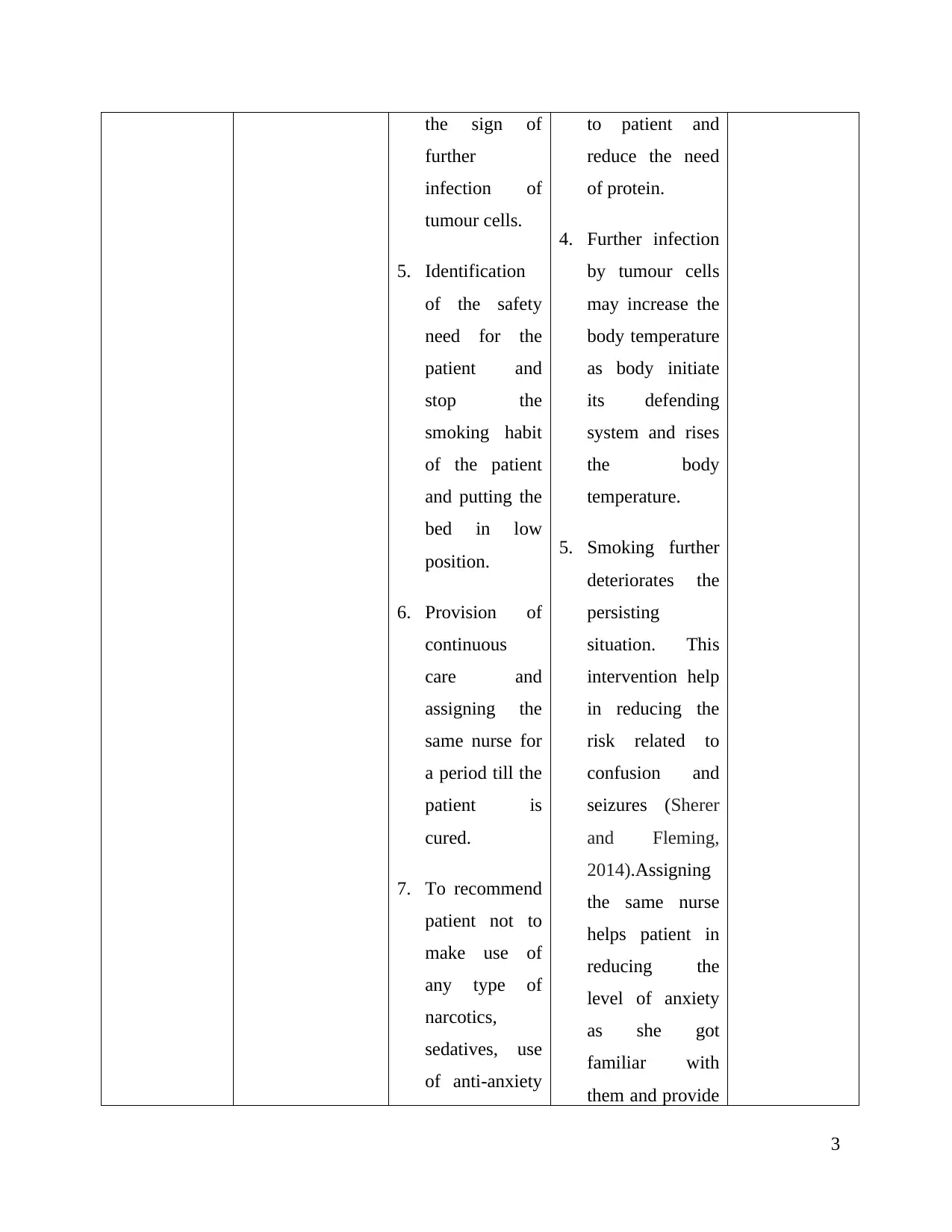
the sign of
further
infection of
tumour cells.
5. Identification
of the safety
need for the
patient and
stop the
smoking habit
of the patient
and putting the
bed in low
position.
6. Provision of
continuous
care and
assigning the
same nurse for
a period till the
patient is
cured.
7. To recommend
patient not to
make use of
any type of
narcotics,
sedatives, use
of anti-anxiety
to patient and
reduce the need
of protein.
4. Further infection
by tumour cells
may increase the
body temperature
as body initiate
its defending
system and rises
the body
temperature.
5. Smoking further
deteriorates the
persisting
situation. This
intervention help
in reducing the
risk related to
confusion and
seizures (Sherer
and Fleming,
2014).Assigning
the same nurse
helps patient in
reducing the
level of anxiety
as she got
familiar with
them and provide
3
further
infection of
tumour cells.
5. Identification
of the safety
need for the
patient and
stop the
smoking habit
of the patient
and putting the
bed in low
position.
6. Provision of
continuous
care and
assigning the
same nurse for
a period till the
patient is
cured.
7. To recommend
patient not to
make use of
any type of
narcotics,
sedatives, use
of anti-anxiety
to patient and
reduce the need
of protein.
4. Further infection
by tumour cells
may increase the
body temperature
as body initiate
its defending
system and rises
the body
temperature.
5. Smoking further
deteriorates the
persisting
situation. This
intervention help
in reducing the
risk related to
confusion and
seizures (Sherer
and Fleming,
2014).Assigning
the same nurse
helps patient in
reducing the
level of anxiety
as she got
familiar with
them and provide
3
Paraphrase This Document
Need a fresh take? Get an instant paraphrase of this document with our AI Paraphraser
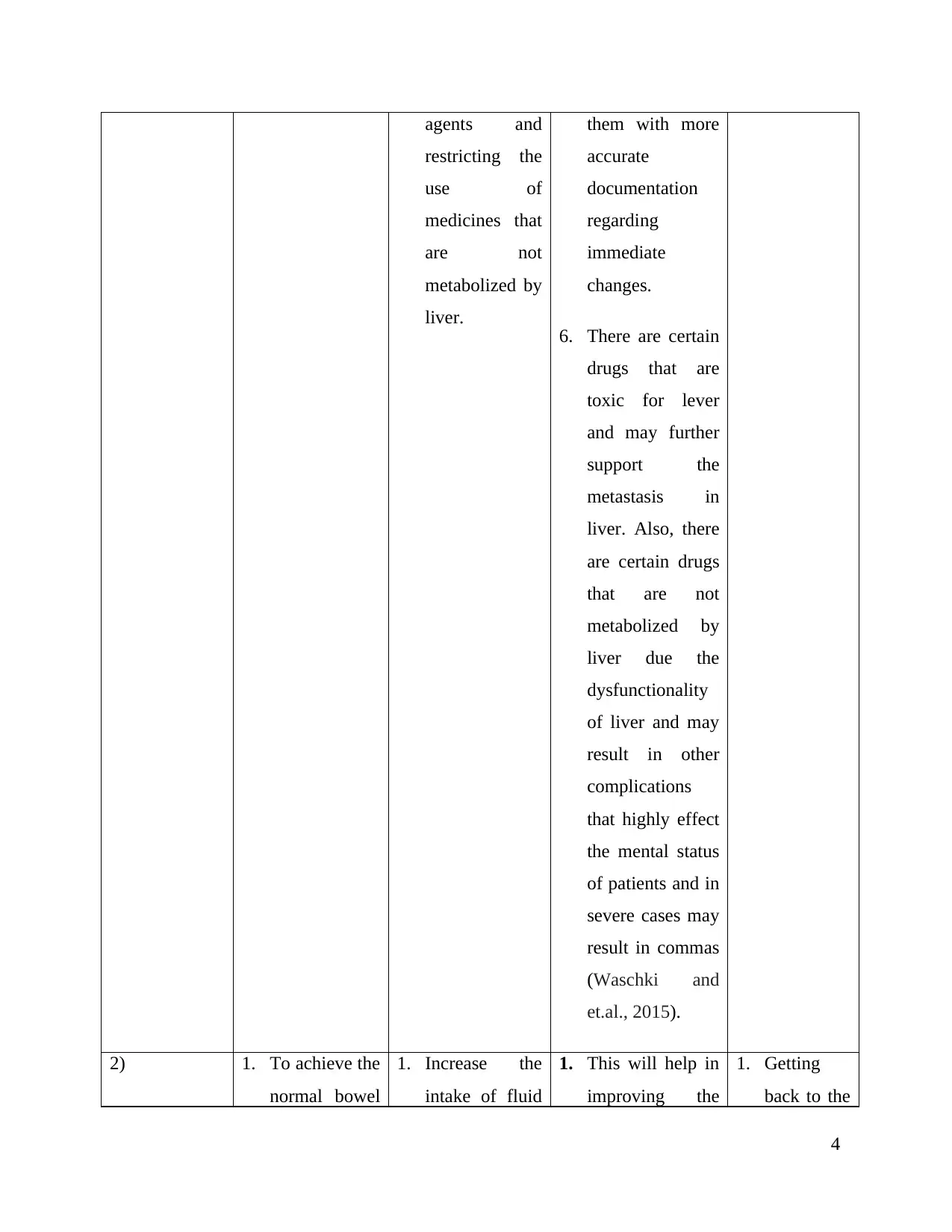
agents and
restricting the
use of
medicines that
are not
metabolized by
liver.
them with more
accurate
documentation
regarding
immediate
changes.
6. There are certain
drugs that are
toxic for lever
and may further
support the
metastasis in
liver. Also, there
are certain drugs
that are not
metabolized by
liver due the
dysfunctionality
of liver and may
result in other
complications
that highly effect
the mental status
of patients and in
severe cases may
result in commas
(Waschki and
et.al., 2015).
2) 1. To achieve the
normal bowel
1. Increase the
intake of fluid
1. This will help in
improving the
1. Getting
back to the
4
restricting the
use of
medicines that
are not
metabolized by
liver.
them with more
accurate
documentation
regarding
immediate
changes.
6. There are certain
drugs that are
toxic for lever
and may further
support the
metastasis in
liver. Also, there
are certain drugs
that are not
metabolized by
liver due the
dysfunctionality
of liver and may
result in other
complications
that highly effect
the mental status
of patients and in
severe cases may
result in commas
(Waschki and
et.al., 2015).
2) 1. To achieve the
normal bowel
1. Increase the
intake of fluid
1. This will help in
improving the
1. Getting
back to the
4
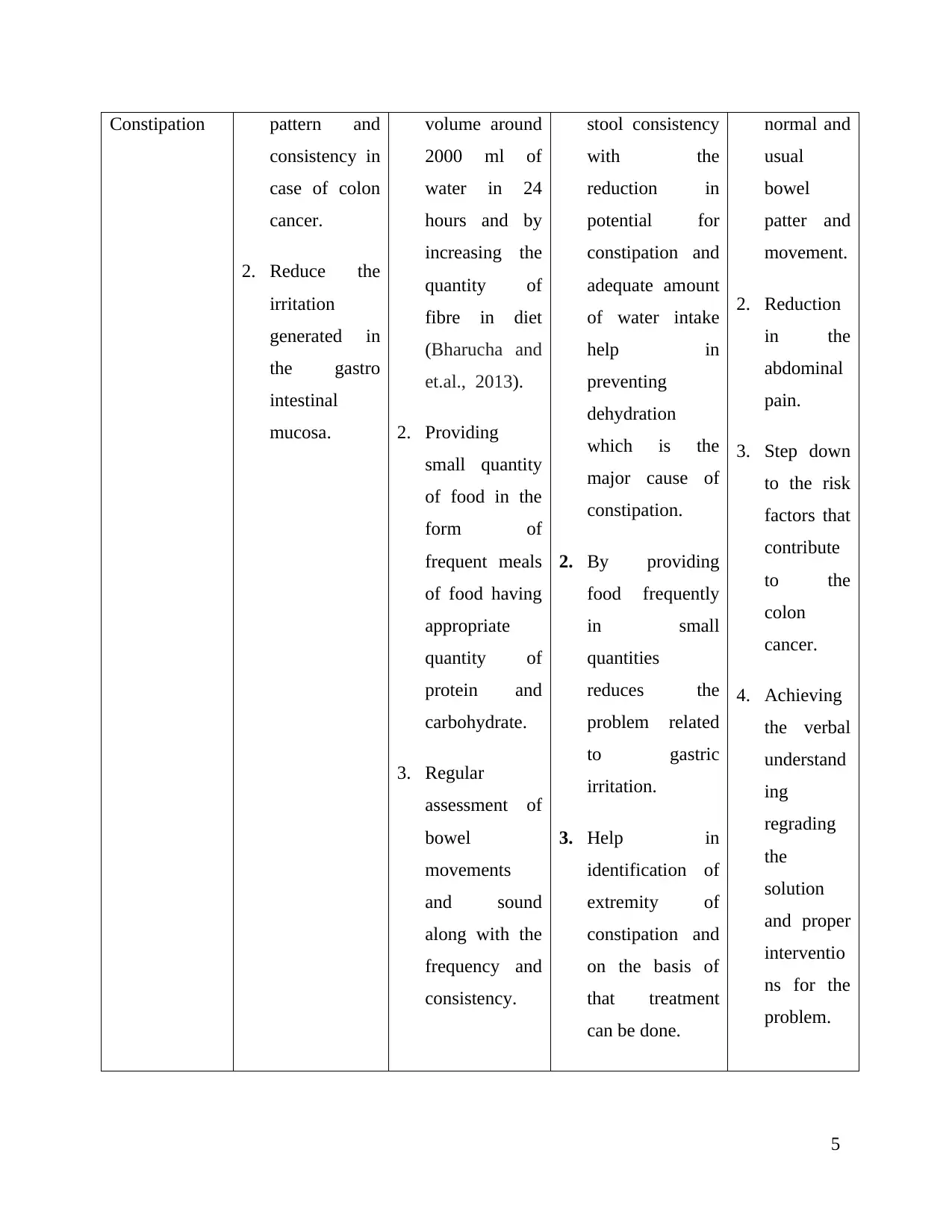
Constipation pattern and
consistency in
case of colon
cancer.
2. Reduce the
irritation
generated in
the gastro
intestinal
mucosa.
volume around
2000 ml of
water in 24
hours and by
increasing the
quantity of
fibre in diet
(Bharucha and
et.al., 2013).
2. Providing
small quantity
of food in the
form of
frequent meals
of food having
appropriate
quantity of
protein and
carbohydrate.
3. Regular
assessment of
bowel
movements
and sound
along with the
frequency and
consistency.
stool consistency
with the
reduction in
potential for
constipation and
adequate amount
of water intake
help in
preventing
dehydration
which is the
major cause of
constipation.
2. By providing
food frequently
in small
quantities
reduces the
problem related
to gastric
irritation.
3. Help in
identification of
extremity of
constipation and
on the basis of
that treatment
can be done.
normal and
usual
bowel
patter and
movement.
2. Reduction
in the
abdominal
pain.
3. Step down
to the risk
factors that
contribute
to the
colon
cancer.
4. Achieving
the verbal
understand
ing
regrading
the
solution
and proper
interventio
ns for the
problem.
5
consistency in
case of colon
cancer.
2. Reduce the
irritation
generated in
the gastro
intestinal
mucosa.
volume around
2000 ml of
water in 24
hours and by
increasing the
quantity of
fibre in diet
(Bharucha and
et.al., 2013).
2. Providing
small quantity
of food in the
form of
frequent meals
of food having
appropriate
quantity of
protein and
carbohydrate.
3. Regular
assessment of
bowel
movements
and sound
along with the
frequency and
consistency.
stool consistency
with the
reduction in
potential for
constipation and
adequate amount
of water intake
help in
preventing
dehydration
which is the
major cause of
constipation.
2. By providing
food frequently
in small
quantities
reduces the
problem related
to gastric
irritation.
3. Help in
identification of
extremity of
constipation and
on the basis of
that treatment
can be done.
normal and
usual
bowel
patter and
movement.
2. Reduction
in the
abdominal
pain.
3. Step down
to the risk
factors that
contribute
to the
colon
cancer.
4. Achieving
the verbal
understand
ing
regrading
the
solution
and proper
interventio
ns for the
problem.
5
⊘ This is a preview!⊘
Do you want full access?
Subscribe today to unlock all pages.

Trusted by 1+ million students worldwide
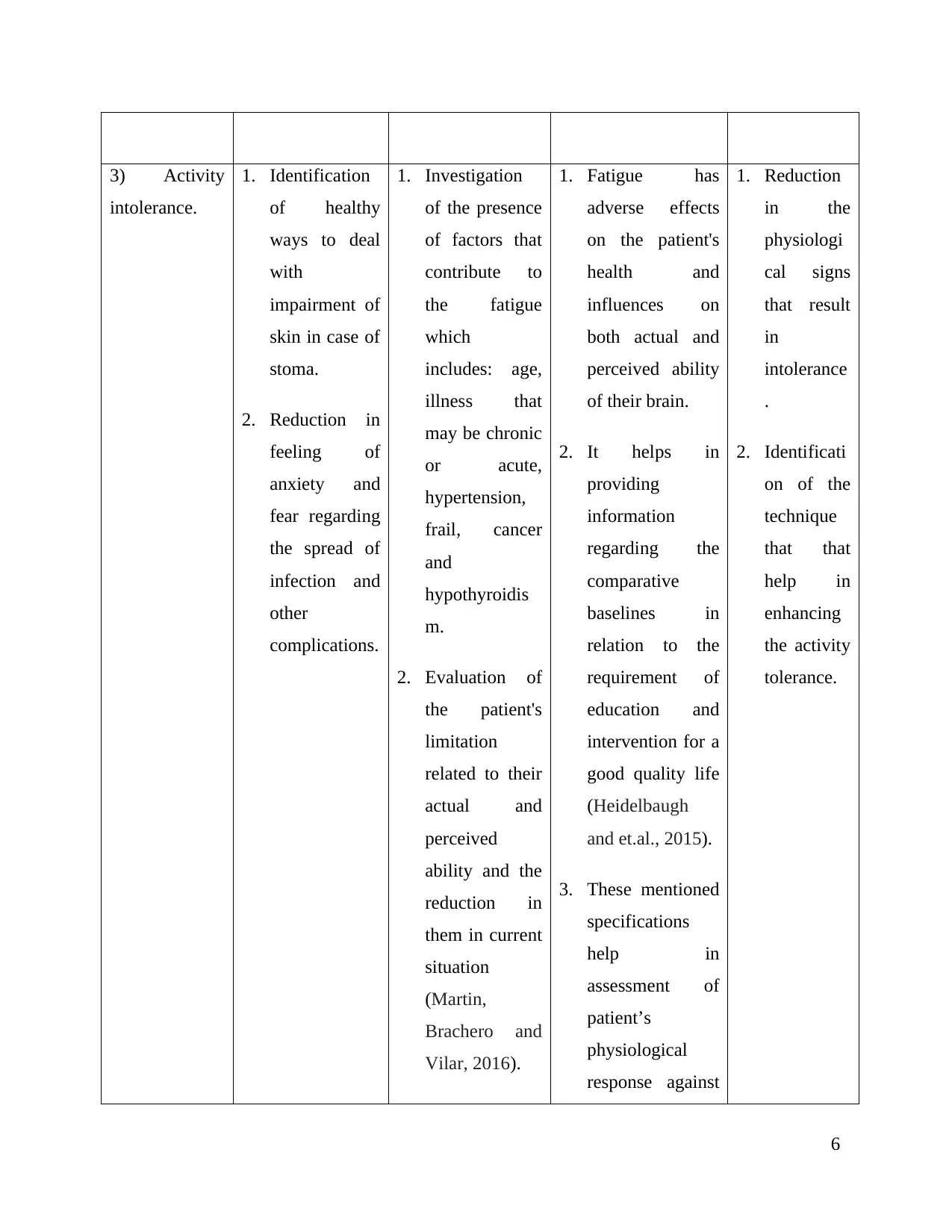
3) Activity
intolerance.
1. Identification
of healthy
ways to deal
with
impairment of
skin in case of
stoma.
2. Reduction in
feeling of
anxiety and
fear regarding
the spread of
infection and
other
complications.
1. Investigation
of the presence
of factors that
contribute to
the fatigue
which
includes: age,
illness that
may be chronic
or acute,
hypertension,
frail, cancer
and
hypothyroidis
m.
2. Evaluation of
the patient's
limitation
related to their
actual and
perceived
ability and the
reduction in
them in current
situation
(Martin,
Brachero and
Vilar, 2016).
1. Fatigue has
adverse effects
on the patient's
health and
influences on
both actual and
perceived ability
of their brain.
2. It helps in
providing
information
regarding the
comparative
baselines in
relation to the
requirement of
education and
intervention for a
good quality life
(Heidelbaugh
and et.al., 2015).
3. These mentioned
specifications
help in
assessment of
patient’s
physiological
response against
1. Reduction
in the
physiologi
cal signs
that result
in
intolerance
.
2. Identificati
on of the
technique
that that
help in
enhancing
the activity
tolerance.
6
intolerance.
1. Identification
of healthy
ways to deal
with
impairment of
skin in case of
stoma.
2. Reduction in
feeling of
anxiety and
fear regarding
the spread of
infection and
other
complications.
1. Investigation
of the presence
of factors that
contribute to
the fatigue
which
includes: age,
illness that
may be chronic
or acute,
hypertension,
frail, cancer
and
hypothyroidis
m.
2. Evaluation of
the patient's
limitation
related to their
actual and
perceived
ability and the
reduction in
them in current
situation
(Martin,
Brachero and
Vilar, 2016).
1. Fatigue has
adverse effects
on the patient's
health and
influences on
both actual and
perceived ability
of their brain.
2. It helps in
providing
information
regarding the
comparative
baselines in
relation to the
requirement of
education and
intervention for a
good quality life
(Heidelbaugh
and et.al., 2015).
3. These mentioned
specifications
help in
assessment of
patient’s
physiological
response against
1. Reduction
in the
physiologi
cal signs
that result
in
intolerance
.
2. Identificati
on of the
technique
that that
help in
enhancing
the activity
tolerance.
6
Paraphrase This Document
Need a fresh take? Get an instant paraphrase of this document with our AI Paraphraser
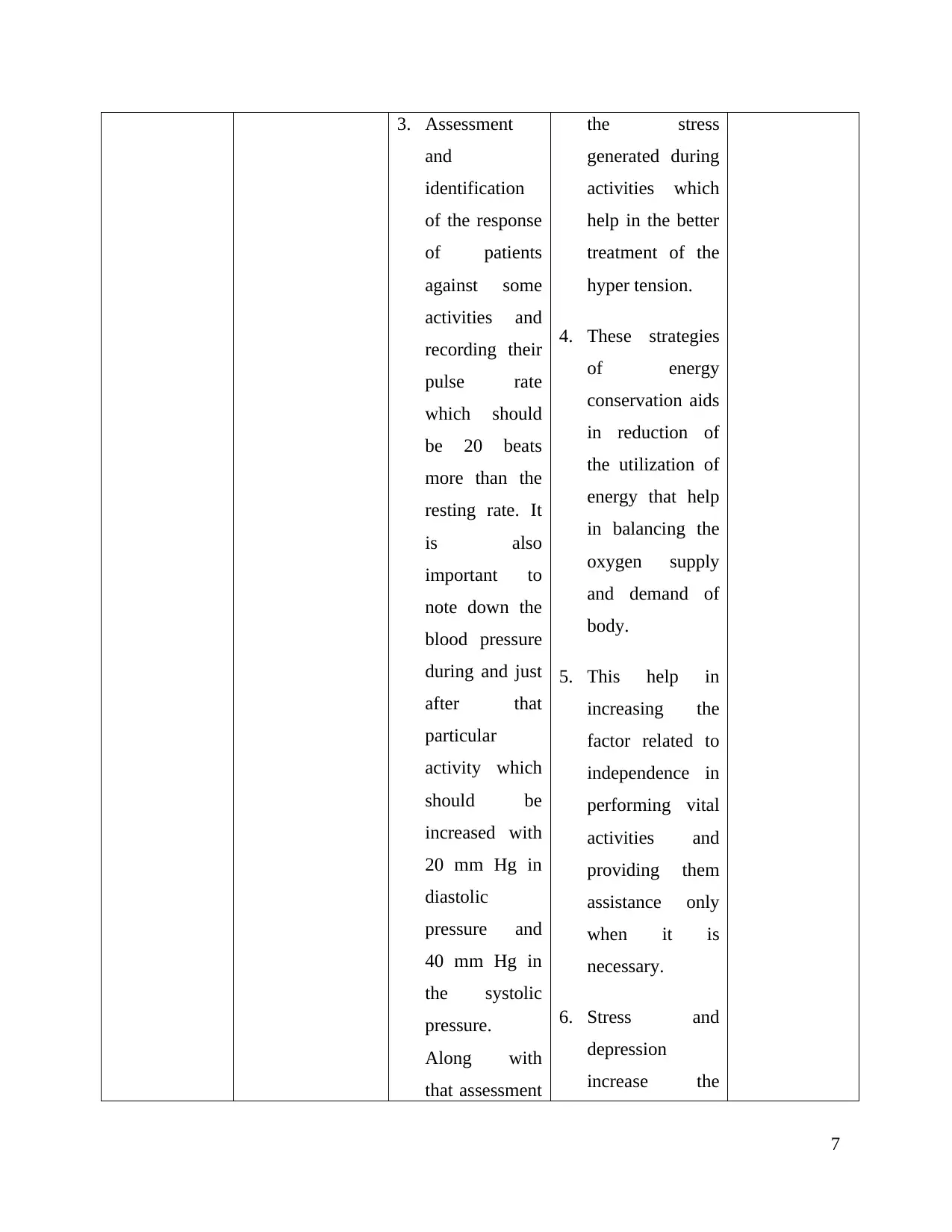
3. Assessment
and
identification
of the response
of patients
against some
activities and
recording their
pulse rate
which should
be 20 beats
more than the
resting rate. It
is also
important to
note down the
blood pressure
during and just
after that
particular
activity which
should be
increased with
20 mm Hg in
diastolic
pressure and
40 mm Hg in
the systolic
pressure.
Along with
that assessment
the stress
generated during
activities which
help in the better
treatment of the
hyper tension.
4. These strategies
of energy
conservation aids
in reduction of
the utilization of
energy that help
in balancing the
oxygen supply
and demand of
body.
5. This help in
increasing the
factor related to
independence in
performing vital
activities and
providing them
assistance only
when it is
necessary.
6. Stress and
depression
increase the
7
and
identification
of the response
of patients
against some
activities and
recording their
pulse rate
which should
be 20 beats
more than the
resting rate. It
is also
important to
note down the
blood pressure
during and just
after that
particular
activity which
should be
increased with
20 mm Hg in
diastolic
pressure and
40 mm Hg in
the systolic
pressure.
Along with
that assessment
the stress
generated during
activities which
help in the better
treatment of the
hyper tension.
4. These strategies
of energy
conservation aids
in reduction of
the utilization of
energy that help
in balancing the
oxygen supply
and demand of
body.
5. This help in
increasing the
factor related to
independence in
performing vital
activities and
providing them
assistance only
when it is
necessary.
6. Stress and
depression
increase the
7
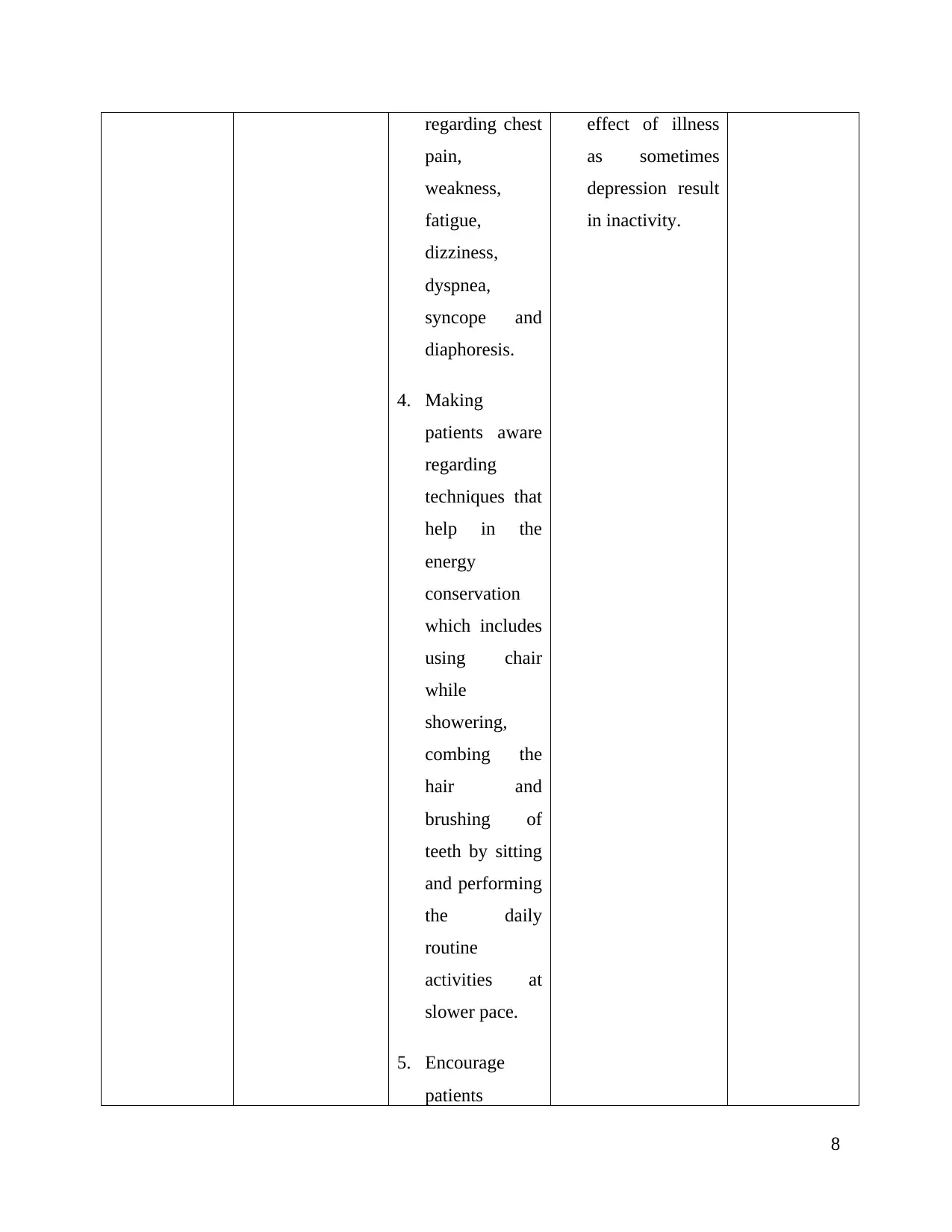
regarding chest
pain,
weakness,
fatigue,
dizziness,
dyspnea,
syncope and
diaphoresis.
4. Making
patients aware
regarding
techniques that
help in the
energy
conservation
which includes
using chair
while
showering,
combing the
hair and
brushing of
teeth by sitting
and performing
the daily
routine
activities at
slower pace.
5. Encourage
patients
effect of illness
as sometimes
depression result
in inactivity.
8
pain,
weakness,
fatigue,
dizziness,
dyspnea,
syncope and
diaphoresis.
4. Making
patients aware
regarding
techniques that
help in the
energy
conservation
which includes
using chair
while
showering,
combing the
hair and
brushing of
teeth by sitting
and performing
the daily
routine
activities at
slower pace.
5. Encourage
patients
effect of illness
as sometimes
depression result
in inactivity.
8
⊘ This is a preview!⊘
Do you want full access?
Subscribe today to unlock all pages.

Trusted by 1+ million students worldwide
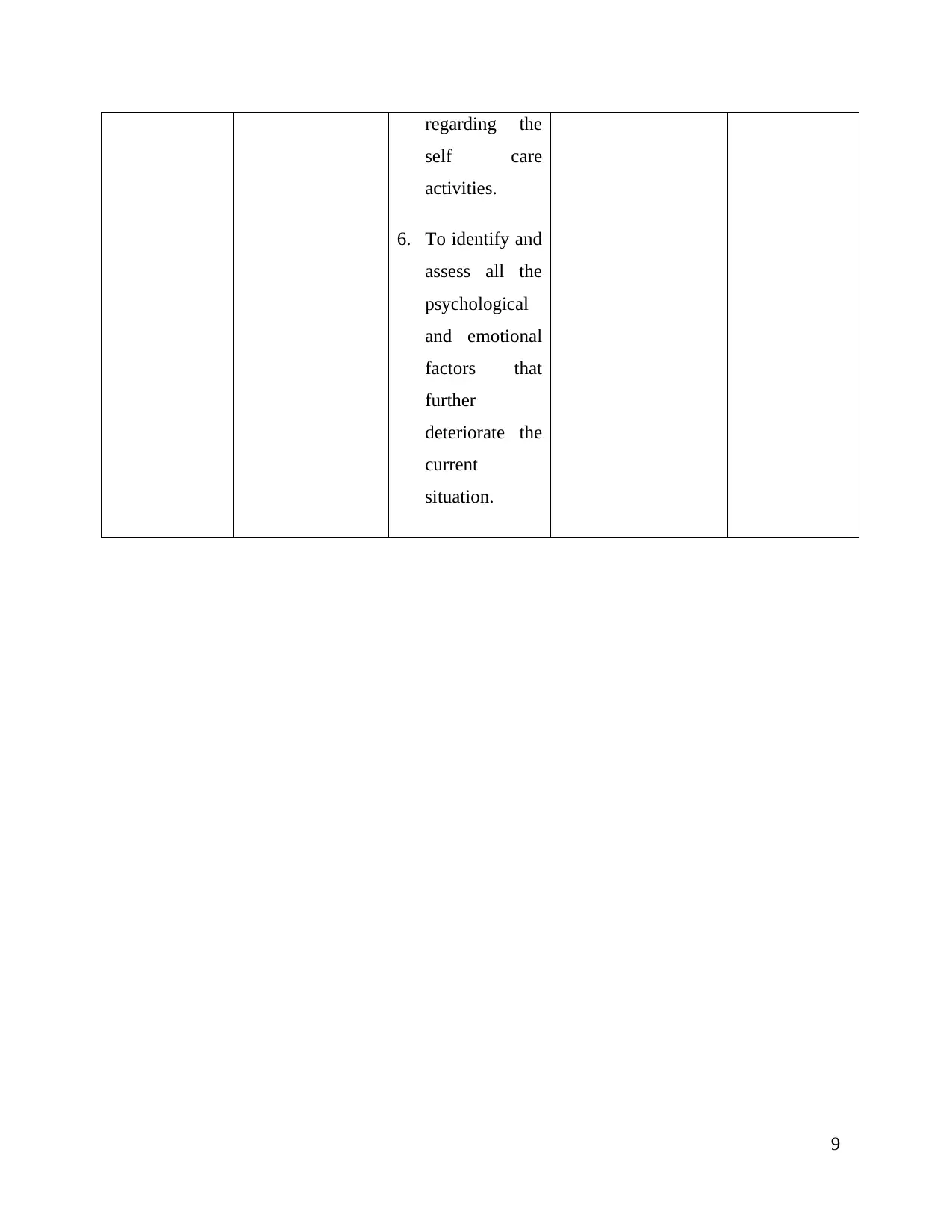
regarding the
self care
activities.
6. To identify and
assess all the
psychological
and emotional
factors that
further
deteriorate the
current
situation.
9
self care
activities.
6. To identify and
assess all the
psychological
and emotional
factors that
further
deteriorate the
current
situation.
9
Paraphrase This Document
Need a fresh take? Get an instant paraphrase of this document with our AI Paraphraser
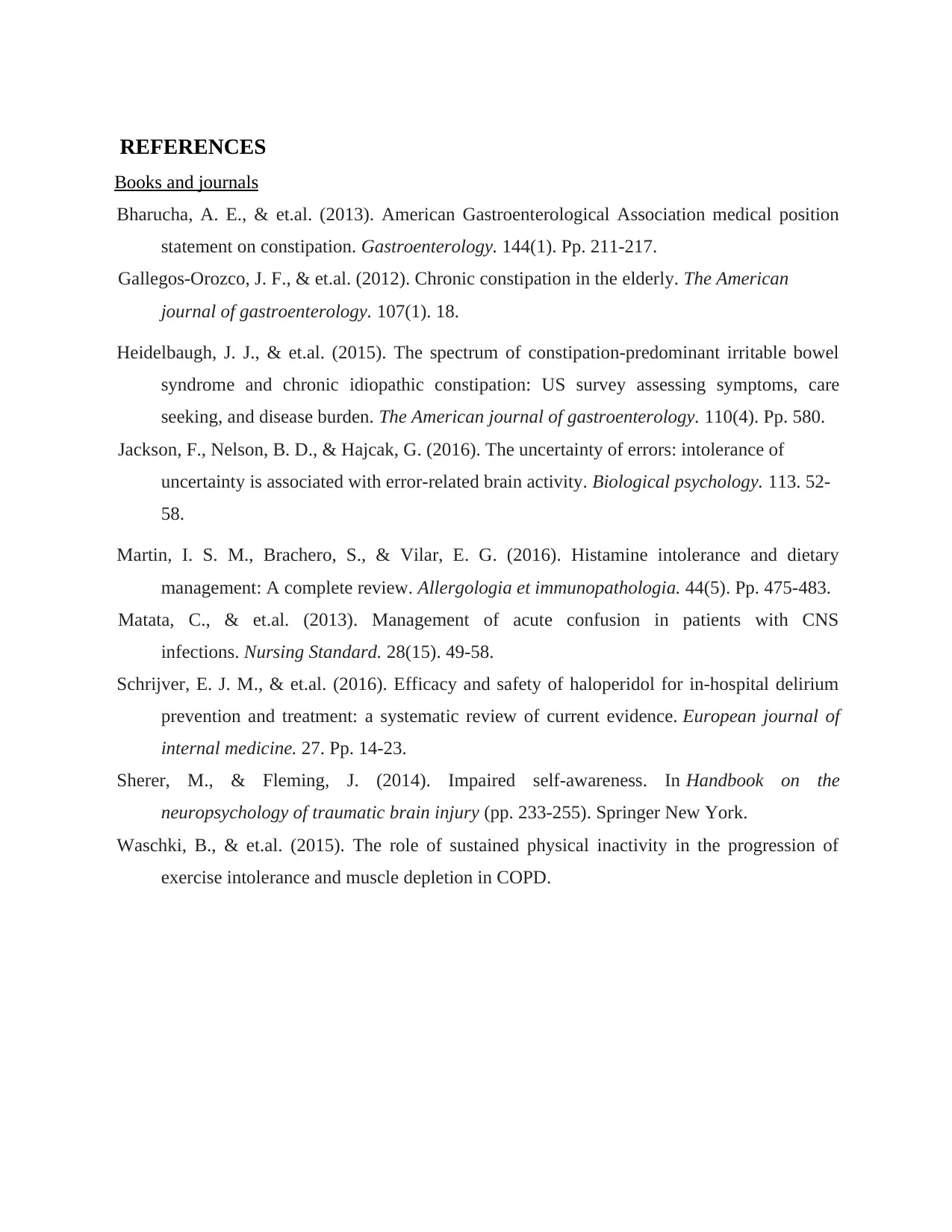
REFERENCES
Books and journals
Bharucha, A. E., & et.al. (2013). American Gastroenterological Association medical position
statement on constipation. Gastroenterology. 144(1). Pp. 211-217.
Gallegos-Orozco, J. F., & et.al. (2012). Chronic constipation in the elderly. The American
journal of gastroenterology. 107(1). 18.
Heidelbaugh, J. J., & et.al. (2015). The spectrum of constipation-predominant irritable bowel
syndrome and chronic idiopathic constipation: US survey assessing symptoms, care
seeking, and disease burden. The American journal of gastroenterology. 110(4). Pp. 580.
Jackson, F., Nelson, B. D., & Hajcak, G. (2016). The uncertainty of errors: intolerance of
uncertainty is associated with error-related brain activity. Biological psychology. 113. 52-
58.
Martin, I. S. M., Brachero, S., & Vilar, E. G. (2016). Histamine intolerance and dietary
management: A complete review. Allergologia et immunopathologia. 44(5). Pp. 475-483.
Matata, C., & et.al. (2013). Management of acute confusion in patients with CNS
infections. Nursing Standard. 28(15). 49-58.
Schrijver, E. J. M., & et.al. (2016). Efficacy and safety of haloperidol for in-hospital delirium
prevention and treatment: a systematic review of current evidence. European journal of
internal medicine. 27. Pp. 14-23.
Sherer, M., & Fleming, J. (2014). Impaired self-awareness. In Handbook on the
neuropsychology of traumatic brain injury (pp. 233-255). Springer New York.
Waschki, B., & et.al. (2015). The role of sustained physical inactivity in the progression of
exercise intolerance and muscle depletion in COPD.
Books and journals
Bharucha, A. E., & et.al. (2013). American Gastroenterological Association medical position
statement on constipation. Gastroenterology. 144(1). Pp. 211-217.
Gallegos-Orozco, J. F., & et.al. (2012). Chronic constipation in the elderly. The American
journal of gastroenterology. 107(1). 18.
Heidelbaugh, J. J., & et.al. (2015). The spectrum of constipation-predominant irritable bowel
syndrome and chronic idiopathic constipation: US survey assessing symptoms, care
seeking, and disease burden. The American journal of gastroenterology. 110(4). Pp. 580.
Jackson, F., Nelson, B. D., & Hajcak, G. (2016). The uncertainty of errors: intolerance of
uncertainty is associated with error-related brain activity. Biological psychology. 113. 52-
58.
Martin, I. S. M., Brachero, S., & Vilar, E. G. (2016). Histamine intolerance and dietary
management: A complete review. Allergologia et immunopathologia. 44(5). Pp. 475-483.
Matata, C., & et.al. (2013). Management of acute confusion in patients with CNS
infections. Nursing Standard. 28(15). 49-58.
Schrijver, E. J. M., & et.al. (2016). Efficacy and safety of haloperidol for in-hospital delirium
prevention and treatment: a systematic review of current evidence. European journal of
internal medicine. 27. Pp. 14-23.
Sherer, M., & Fleming, J. (2014). Impaired self-awareness. In Handbook on the
neuropsychology of traumatic brain injury (pp. 233-255). Springer New York.
Waschki, B., & et.al. (2015). The role of sustained physical inactivity in the progression of
exercise intolerance and muscle depletion in COPD.
1 out of 11
Your All-in-One AI-Powered Toolkit for Academic Success.
+13062052269
info@desklib.com
Available 24*7 on WhatsApp / Email
![[object Object]](/_next/static/media/star-bottom.7253800d.svg)
Unlock your academic potential
Copyright © 2020–2025 A2Z Services. All Rights Reserved. Developed and managed by ZUCOL.
